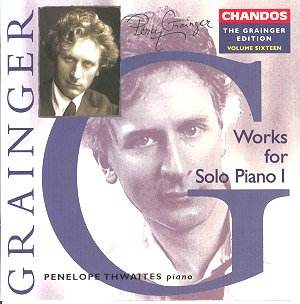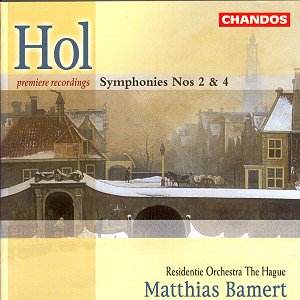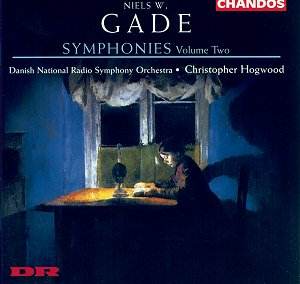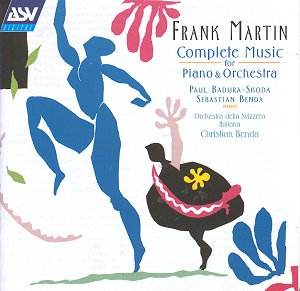 Composer: Percy Grainger
Composer: Percy Grainger
Works: Works for Solo Piano, Volume 1: Klavierstücke: Preludes – G, C; Birthday Gift – Gigue; Andante con moto; Klavierstücke – D, E, A minor, B flat; Peace; Saxon Twi-Ply; Eastern Intermezzo; English Waltz; At Twilight; Train Music; Sailor’s Song; Walking Tune, RMTB No. 3; Three Scottish Folktunes – No. 1, O gin I were where Gadie runs, Will ye gang to the Hielands, Leezie Lindsay?, Mo Nighean Dubh; Scotch Strathspey and Reel; Seven men from all the world; Paraphrase on Tchaikovsky’s Flower Waltz; Irish Tune from County Derry, BFMS No. 6; Near Woodstock Town; In Dahomey (‘Cakewalk Smasher’).
Performers: Penelope Thwaites (piano)
Recording: Recorded in St Paul’s, Knightsbridge on April 3rd-5th, 2000. [DDD]
Label: CHANDOS
Percy Grainger, a unique voice in early 20th-century music, remains a figure of profound interest not only for his compositional innovations but also for his enthusiastic embrace of folk traditions and cultural eclecticism. The first volume of his piano works, part of the Grainger Edition, showcases a range of pieces from the composer’s formative years, specifically those penned between 1893 and 1903. This historical context is vital, as it reveals a young Grainger exploring his musical identity, infusing classical forms with the spirit of his Australian upbringing and his deep admiration for folk music.
Penelope Thwaites, a dedicated advocate of Grainger’s oeuvre, brings a nuanced understanding to these compositions. Her performances reveal a thoughtful balance between nostalgia and technical precision. The two Preludes, while markedly youthful in their Bach-inspired simplicity, offer a glimpse into Grainger’s burgeoning voice. Thwaites approaches these works with a gentle hand, allowing the melodic lines to breathe, yet they occasionally lack the vibrancy that might elevate them beyond mere curiosities. The E major Klavierstück, which flirts with prettiness, is delivered with a restraint that, while effective, leaves the listener yearning for more expressive depth.
Among the more engaging selections, the Eastern Intermezzo stands out as a testament to Grainger’s fascination with the music of his youth, specifically the Chinese influence he encountered in Melbourne. Thwaites’s interpretation captures the piece’s tender affection, revealing the underlying harmonic richness with a deft touch. The Walking Tune and the Three Scottish Folktunes demonstrate her ability to infuse simplicity with warmth and integrity, though one might wish for a bit more exuberance in the latter’s spirited passages. The vivid storytelling inherent in these folk melodies is conveyed with sincerity, yet they sometimes feel restrained within the confines of Thwaites’s interpretative choices.
The recording quality in this release is commendable, with the acoustic of St Paul’s Knightsbridge enhancing the clarity of Thwaites’s playing. The engineering allows the piano to resonate in a way that complements the music’s lyrical and rhythmic characteristics without overwhelming them. However, while the sound is pristine, certain pieces, particularly the more spirited selections like the Paraphrase on Tchaikovsky’s Flower Waltz and the exuberant In Dahomey, could have benefited from a more unabashed approach, showcasing the full range of Grainger’s playful complexity. Thwaites, while technically proficient, occasionally opts for caution rather than the abandon that these works might inspire.
When compared to other notable recordings, such as Martin Jones’s expansive Nimbus collection, Thwaites’s interpretations feel more intimate but perhaps less adventurous. Jones’s performances tend to exude a consistent musicianship that, while polished, may lack the emotional depth present in Thwaites’s more thoughtful renditions. The premiere recordings of several pieces featured here, including the Gigue from Birthday Gift and Seven Men from All the World, provide valuable insights into Grainger’s early style, but they also highlight the unevenness of his early output.
The scholarly interest in this volume cannot be overstated, making it a worthy addition to any music library. While Thwaites brings an admirable dedication to Grainger’s music, the purely musical experience does not always match the rich historical context. The emotional resonance, particularly in the more playful and virtuosic moments, often feels muted. This collection serves as an important exploration of Grainger’s early works, yet it leaves one wishing for a bolder interpretative vision that could fully realize the composer’s vibrant spirit.



